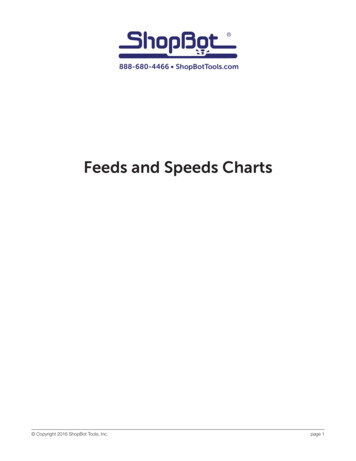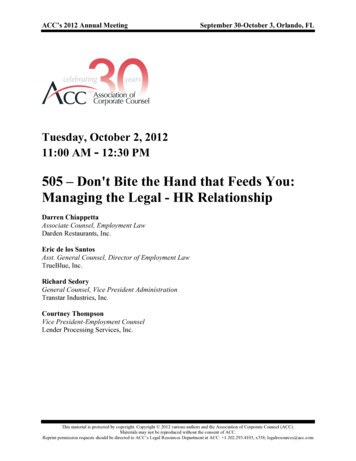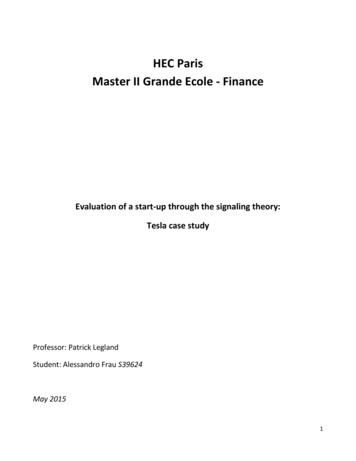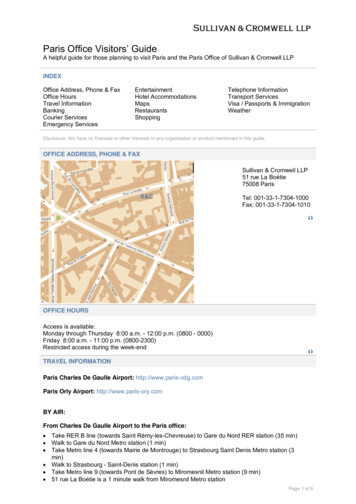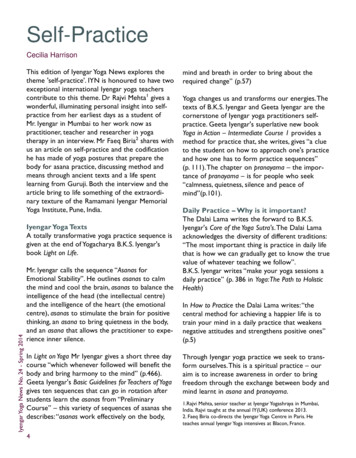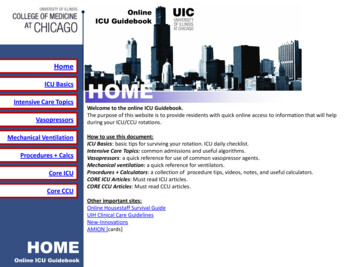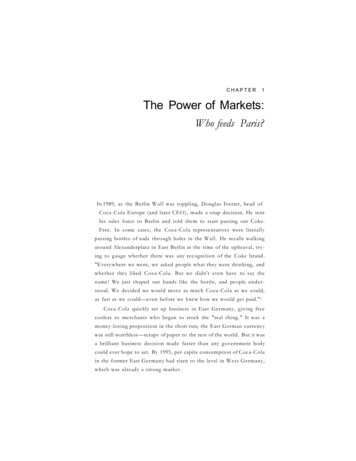
Transcription
CHAPTER1The Power of Markets:Who feeds Paris?In 1989, as the Berlin W a l l was toppling, Douglas Ivester, head ofCoca-Cola Europe (and later CEO), made a snap decision. He senthis sales force to Berlin and told them to start passing out Coke.Free. In some cases, the Coca-Cola representatives were literallypassing bottles of soda through holes in the W a l l . He recalls walkingaround Alexanderplatz in East Berlin at the time of the upheaval, trying to gauge whether there was any recognition of the Coke brand."Everywhere we went, we asked people what they were drinking, andwhether they liked Coca-Cola. But we didn't even have to say thename! We just shaped our hands like the bottle, and people understood. We decided we would move as much Coca-Cola as we could,as fast as we could—even before we knew how we would get paid." 1Coca-Cola quickly set up business in East Germany, giving freecoolers to merchants who began to stock the "real thing." It was amoney-losing proposition in the short run; the East German currencywas still worthless—scraps of paper to the rest of the world. But it wasa brilliant business decision made faster than any government bodycould ever hope to act. By 1995, per capita consumption of Coca-Colain the former East Germany had risen to the level in W e s t Germany,which was already a strong market.
4 naked economicsIn a sense, it was Adam Smith's invisible hand passing Coca-Colathrough the Berlin Wall. Coke representatives weren't undertakingany great humanitarian gesture as they passed beverages to the newlyliberated East Germans. Nor were they making a bold statement aboutthe future of communism. T h e y were looking after business—expanding their global market, boosting profits, and making shareholdershappy. And that is the punch line of capitalism: T h e market alignsincentives in such a way that individuals working for their own bestinterest—passing out Coca-Cola, spending years in graduate school,planting a field of soybeans, designing a radio that will work in theshower—leads to a thriving and ever-improving standard of living formost (though not all) members of society.Economists sometimes ask, "Who feeds Paris?"—a rhetorical wayof drawing attention to the mind-numbing array of things happeningevery moment of every day to make a modern economy work. Somehowthe right amount of fresh tuna makes its way from a fishing fleet in theSouth Pacific to a restaurant on the Rue de Rivoli. A neighborhood fruitvendor has exactly what his customers want every morning—from coffee to fresh papayas—even though those products may come from tenor fifteen different countries. In short, a complex economy involves billions of transactions every day, the vast majority of which happen without any direct government involvement. And it is not just that thingsget done; our lives grow steadily better in the process. It is remarkableenough that we can now shop for a television twenty-four hours a dayfrom the comfort of our own homes; it is equally amazing that in 1971a twenty-five-inch color television set cost an average worker 174 hoursof wages. Today, a twenty-five-inch color television set—one that ismore dependable, gets more channels, and has better reception—coststhe average worker about twenty-three hours of pay.If you think that a better, cheaper television set is not the bestmeasure of social progress (a reasonable point, I concede), then perhaps you will be moved by the fact that, during the twentieth century,American life expectancy climbed from forty-seven years to seventy-
The Power of Markets 5seven, infant mortality plunged by 93 percent, and we wiped out orgained control over diseases such as polio, tuberculosis, typhoid, andwhooping cough. 2Our market economy deserves a lot of the credit for that progress.T h e r e is an old Cold W a r story about a Soviet official who visitsan American pharmacy. T h e brightly lit aisles are lined with thousands of remedies for every problem from bad breath to toe fungus."Very impressive," he says. "But how can you make sure that everystore stocks all of these items?" T h e anecdote is interesting because itbetrays a total lack of understanding of how a market economy works.In America, there is no central authority that tells stores what itemsto stock, as there was in the Soviet Union. Stores sell the productsthat people want to buy, and, in turn, companies produce items thatstores want to stock. T h e Soviet economy failed in large part becausegovernment bureaucrats directed everything, from the number of barsof soap produced by a factory in Irktusk to the number of universitystudents studying electrical engineering in Moscow. In the end, thetask proved overwhelming.Of course, those of us accustomed to market economies have anequally poor understanding of communist central planning. I wasonce part of an Illinois delegation visiting Cuba. Because the visit waslicensed by the U.S. government, each member of die delegation wasallowed to bring back 100 worth of Cuban merchandise, includingcigars. Having been raised in the era of discount stores, we all set outlooking for the best price on Cohibas so that we could get the mostbang for our 100 allowance. After several fruitless hours, we discovered the whole point of communism: T h e price of cigars was the sameeverywhere. There is no competition between stores because there isno profit as we know it. Every store sells cigars—and everything elsefor that matter—at whatever price Fidel Castro (or his brother Raul)tells them to. And every shopkeeper selling cigars is paid the government wage for selling cigars, which is unrelated to how many cigarshe or she sells.
6 naked economicsGary Becker, a University of Chicago economist who won the NobelPrize in 1992, has noted (borrowing from George Bernard Shaw) that"economy is the art of making the most of life." Economics is the studyof how we do that. There is a finite supply of everything worth having: oil, coconut milk, perfect bodies, clean water, people who can fixjammed photocopy machines, etc. How do we allocate these things?W h y is it that Bill Gates owns a private jet and you don't? He is rich,you might answer. But why is he rich? W h y does he have a larger claimon the world's finite resources than everyone else? At the same time,how is it possible in a country as rich as the United States—a placewhere Alex Rodriguez can be paid 275 million to play baseball—thatone in five children is poor or that some adults are forced to rummagethrough garbage cans for food? Near my home in Chicago, the ThreeDog Bakery sells cakes and pastries only for dogs. Wealthy professionals pay 16 for birthday cakes for their pets. Meanwhile, the ChicagoCoalition for the Homeless estimates that fifteen thousand people arehomeless on any given night in that same city.These kinds of disparities grow even more pronounced as we lookbeyond the borders of the United States. Three-quarters of the peoplein Chad have no access to clean drinking water, let alone pastries fortheir pets. T h e W o r l d Bank estimates that half of the world's population survives on less than 2 a day. How does it all work—or, in somecases, not work?Economics starts with one very important assumption: Individualsact to make themselves as well off as possible. To use the jargon ofthe profession, individuals seek to maximize their own utility, whichis a similar concept to happiness, only broader. I derive utility fromgetting a typhoid immunization and paying taxes. Neither of thesethings makes me particularly happy, but they do keep me from dyingof typhoid or going to jail. That, in the long run, makes me better off.Economists don't particularly care what gives us utility; they simplyaccept that each of us has his or her own "preferences." I like cof-
The Power of Markets 7fee, old houses, classic films, dogs, bicycling, and many other things.Everyone else in the world has preferences, which may or may nothave anything in common with mine.Indeed, this seemingly simple observation that different individuals have different preferences is sometimes lost on otherwisesophisticated policymakers. For example, rich people have differentpreferences than poor people do. Similarly, our individual preferencesmay change over the course of our life cycle as we (we hope) growwealthier. T h e phrase "luxury good" actually has a technical meaningto economists; it is a good that we buy in increasing quantities as wegrow richer—things like sports cars and French wines. Less obviously,concern for the environment is a luxury good. W e a l t h y Americans arewilling to spend more money to protect the environment as a fractionof their incomes than are less wealthy Americans. T h e same relationshipholds true across countries; wealthy nations devote a greater share oftheir resources to protecting the environment than do poor countries.T h e reason is simple enough: We care about the fate of the Bengaltiger because we can. We have homes and jobs and clean water andbirthday cakes for our dogs.Here is a nettlesome policy question: Is it fair for those of us wholive comfortably to impose our preferences on individuals in the developing world? Economists argue that it is not, though we do it all thetime. W h e n I read a story in the Sunday New York Times about SouthAmerican villagers cutting down virgin rain forest and destroying rareecosystems, I nearly knock over my Starbucks latte in surprise and disgust. But I am not they. My children are not starving or at risk of dyingfrom malaria. If they were, and if chopping down a valuable wildlifehabitat enabled me to afford to feed my family and buy a mosquitonet, then I would sharpen my ax and start chopping. I wouldn't carehow many butterflies or spotted weasels I killed. This is not to suggest that the environment in the developing world does not matter. Itdoes. In fact, there are many examples of environmental degradationthat will make poor countries even poorer in the long run. Cutting
8 naked economicsdown those forests is bad for the rest of us, too, since deforestation isa major contributor to rising CO, emissions. (Economists often arguethat rich countries ought to pay poor countries to protect naturalresources that have global value.)Obviously if the developed world were more generous, thenBrazilian villagers might not have to decide between destroying therain forest and buying mosquito nets. For now, the point is more basic:It is simply bad economics to impose our preferences on individualswhose lives are much, much different. This will be an important pointlater in the book when we turn to globalization and world trade.Let me make one other important point regarding our individualpreferences: Maximizing utility is not synonymous with acting selfishly. In 1999, the New York Times published the obituary of OseolaMcCarty, a woman who died at the age of ninety-one after spendingher life working as a laundress in Hattiesburg, Mississippi. She hadlived alone in a small, sparsely furnished house with a black-and-whitetelevision that received only one channel. W h a t made Ms. McCartyexceptional is that she was by no means poor. In fact, four years beforeher death she gave away 150,000 to the University of SouthernMississippi—a school that she had never attended—to endow a scholarship for poor students.Does Oseola McCarty's behavior turn the field of economics on itshead? Are Nobel Prizes being recalled to Stockholm? No. She simplyderived more utility from saving her money and eventually giving itaway than she would have from spending it on a big-screen TV or afancy apartment.Okay, but that was just money. How about Wesley Autrey, a fiftyyear-old construction worker in N e w York City. He was waiting forthe subway in Upper Manhattan with his two young daughters inJanuary 2007 when a stranger nearby began having convulsions andthen fell on the train tracks. If this wasn't bad enough, the Number 1train was already visible as it approached the station.M r . Autrey jumped on the tracks and shielded the man as five
The Power of Markets 9train cars rolled over both of them, close enough that the train left asmudge of grease on M r . Autrey's hat. W h e n the train came to a stop,he yelled from underneath, "We're O.K. down here, but I've got twodaughters up there. Let them know their father's O.K." 3 This was allto help a complete stranger.We all routinely make altruistic decisions, albeit usually on asmaller scale. We may pay a few cents extra for dolphin-safe tuna, orsend money to a favorite charity, or volunteer to serve in the armedforces. All of these things can give us utility; none would be consideredselfish. Americans give more than 200 billion to assorted charitiesevery year. We hold doors open for strangers. We practice remarkableacts of bravery and generosity. None of this is incompatible with thebasic assumption that individuals seek to make themselves as well offas possible, however they happen to define that. Nor does this assumption imply that we always make perfect—or even good—decisions.We don't. But each of us does try to make the best possible decisiongiven whatever information is available at the time.So, after only a few pages, we have an answer to a profound, ageold philosophical question: W h y did the chicken cross the road?Because it maximized his utility.Bear in mind that maximizing utility is no simple proposition.Life is complex and uncertain. There are an infinite number of thingsthat we could be doing at any time. Indeed, every decision that wemake involves some kind of trade-off. We may trade off utility nowagainst utility in the future. For example, you may derive some satisfaction from whacking your boss on the head with a canoe paddleat the annual company picnic. But that momentary burst of utilitywould presumably be more than offset by the disutility of spendingmany years in a federal prison. (But those are just my preferences.)More seriously,
Economics start wits onh vere importany assumptiont Individual: s act to make themselve as wels ofl afs possible T.o use the jargo on f the profession individual, seesk to maximiz theie owr n utility whic, h is a simila concepr tto happiness onl, broadery I. deriv utilite froy m getting a typhoi immunizatiod and payinn taxesg Neithe. orf these things makes m e particularl happyy , but the y do .


